Telangana SCERT TS 6th Class Social Guide Pdf 12th Lesson Democratic Government Textbook Questions and Answers.
TS 6th Class Social 12th Lesson Questions and Answers -Democratic Government
(Improve Your Learning)
Question 1.
Discuss the similarities and differences between the governments in a Gond tribe and a modern democracy.
Answer:
Similarities:
- Either in a Gond tribe or in modern democracy all families do all kinds of work for their survival.
- Either In Gond tribe or in modern democracy the people give a lot ol importance on shared celebration of festivals.
Differences:
- The people in a Gond tribe are a few but people in modern democracy are many.
- Same cultural background is in Gond tribe hut in modern democracy different cultures are being followed.
- In Gond tribe land may be divided equally among all the families hut in modern democracy this is not possible
- In Gond tribe men have greater power and role in decision-making than women but in modern democracy, both have equal power in decision-making.
Question 2.
Is it possible to include the opinions of the minority in taking a decision? Discuss with some examples. (Conceptual understanding)
Answer:
It is possible to include the minority opinions in taking a decision. A minority person should be elected as a peoples representative. It can express its views feel either in Parliament or in Slate Legislative Assembly on the decisions taken by the government. Nowadays minorities are playing key role in government decisions.
Question 3.
Imagine how your school be if it was run by all the students and teachers together? Would you want everyone to participate in taking decisions or would you like to elect representatives? Give reasons. (Appreciation and Sensitivity)
Answer:
It the school is run by all the students and teachers together it can give good results and promote moral values. Yes, I would like to prefer to form body of elected representatives of children for each committee such as academic, sports, cultural, discipline, mid da meal and sanitation committees. Through these committees, we can encourage them to participate in taking decisions to reach the objectives of the school.
Question 4.
Do you think the decision-making in your house is democratic? Does everyone have a say in it? (Reflection on contemporary issues and questioning)
Answer:
Yes, the decision-making in my house is all democratic. Everyone of our family have a say in it.
![]()
Question 5.
Gopal’s father consulted all the members of the family on setting up of a shop but everyone had a different opinion. Finally, he decided to set up the shop. Do you think he was democratic? (Conceptual understanding
Answer:
No, I think Copal’s father was not democratic in his decision as he decided to open the shop even though
Family members have different opinions about it.
Question 6.
Mary’s mother asked her children where they wanted to go on Sunday. Two children wanted to watch a film and three wanted to go to the park. If you were in Mary’s mother’s place, what decision would you take? Give reasons. (Conceptual understanding)
Answer:
If were in Mary’s place, I would take the decision to go to the park with all the children because majority children wanted to go to the park to play.
Question 7.
Classify the following as per the levels of government (Central, State, Local): MP, MIA, Sarpanch, Mayor, CM, and PM. (Conceptual understanding)
Answer:
| Central government | Member of Parliament (MP), Prime Minister (PM) |
| State government | Member of Legislative Assembly (ML’), Chief Minister (CM) |
| Local government | Mayor, Sarpanch |
Question 8.
Collect the pictures of your local M.P. M.LA and Chief Minister from newspapers.
Answer:
Students Activity. (Information skills)
Question 9.
Draw the outline map of India, observing the map given in this chapter. (Mapping skills)
Answer:
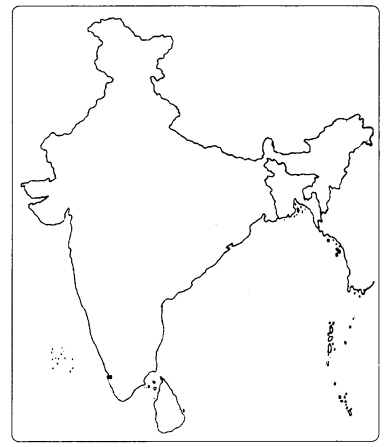
(Project)
Question 1.
Look at the newspapers o the last seven days and collect news ¿bout the activities of the government. Stick them on ana large sheet or notebook. Make a list of activities of the government you find in these clippings. Discuss this list in the class to get an idea of all the things done by the government.
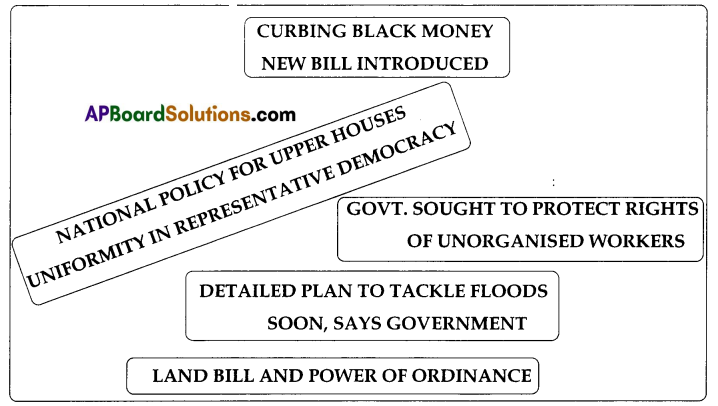
Answer:
List of the different kinds of activities that the government is reported to be doing in the newspaper headlines.
- In Budget 201 5-16. the government had announced to bring in a Law for dealing with illicit money parked abroad.
- Assom Rajasthan, West Bengal, and Odisha have shown their inclination to create a legislative council in their respective state.
- The NDA government looks firmly to promulgate the land ordinance.
- The government projects the rights of the unorganized workers.
- Government tackles floods. With a detailed plan.
Question 2.
Consult any 10 people of your village who have right to vote and collect the information of the particulars they consider while electing a candidate in Elections. Write a report and discuss on it in the classroom.
Answer:
I consulted the people of our village who have right to vote and collected the following information.
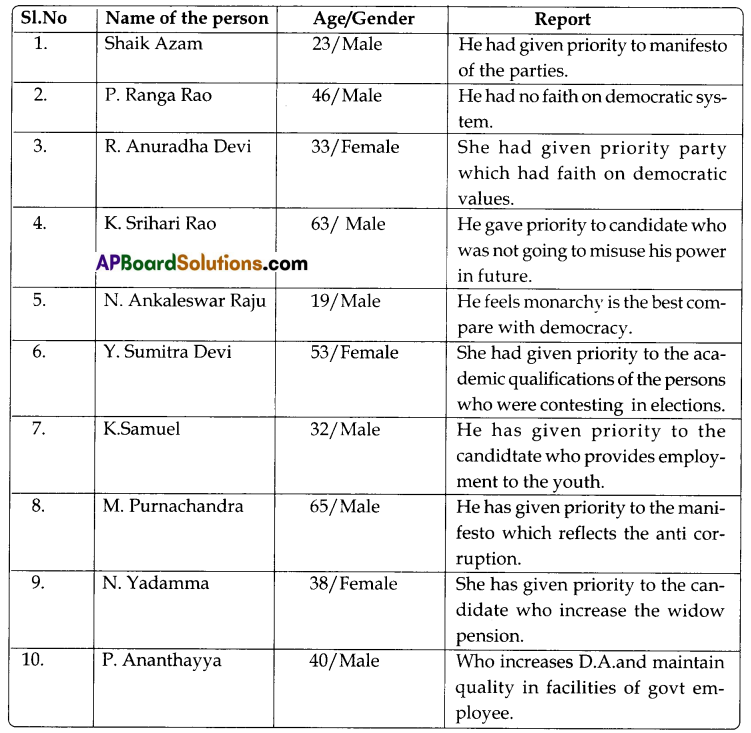
InText Questions
Questions given in Box P.No. 104
Question 1.
Who runs your school?
Answer:
Principal. Headmaster (or) Headmistress
Question 2.
List a few activities of the government that you know.
Answer:
- The government builds roads and schools.
- It protects the boundaries of the coLlntry.
- It maintains peaceful relations with other countries.
- It reduces the prices when they get too expensive.
- It increases the supply of electricity.
- It provide people food and medical facilities.
- It organises aid and assistance for the affected people during natural disasters like tsunamis, earthquakes and floods.
- It implements several programmes to help the poor.
Questions given in Box P. No. 105
Question 3.
Compare tribal democracy with monarchy.
i) Which of the two systems do you think respects the opinion uf the people more?
Answer:
I think tribal community respects the opinion of the people more compared with monarchy.
ii) Which of them do you think can work in a large society or a society of people with different interests and customs?
Answer:
Tribal democracy.
iii) Which of them has the danger of the rulers becoming oppressive and unjust?
Answer:
Monarchy
![]()
Question 4.
Can you think of a system of government which can handle the needs of a large and complex society and yet not become unjust or oppressive?
Answer:
Democratic system of government can handle the needs of a large and complex society and yet not become unjust or oppressive.
Question 5.
In which system were there more wars, monarchy or tribal democracy? Give reasons.
Answer:
I think there would be more wars in monarchies because many of the kings were not satisfied with ruling their own kingdom and constantly waged war to expand their kingdom.
Questions given in Box P. No. 107
Question 6.
Why do you think it is important for people to know the views of the different candi
dates in elections?
Answer:
- It is the ultimate winning candidates that represents the people’s problems. It people elect a candidate who is selfish or who has no knowledge of their problems, the people suffer a lot.
- The people have to know the views of different candidates and to judge their a suitable candidate that can represent and respond to peoples’ problems.
Question 7.
What will happen if the representatives are elected forever?
Answer:
When a person elected as a representative forever, it leads to dictatorship.
Question 8.
Do you think it is possible for the representatives to go against the wishes and Interests of the people who elected them?
Answer:
No. it is not possible for the representatives to go against the wishes and interests of the people because those who disagree with the elected representatives can freels express their views and criticise the representatives through meetings TV, and newspapers etc.
Questions given in Box P. No. 108
Question 9.
Form a Student’s Council (Bal Parishad) to the class to form rules of behavior In the class and take care of the classroom. Try both a system in which all students participate in decision-making and a system in which students elect representatives to the Council. Let all children prepare their own reports of this experience.
Answer:
Example: Zilla Parishad High School (P.No. 109)
Wyra Mandat, Khammam (dt)
Note: In daily life, we come across different functions performed not only by people but also by the students, Here one of the forms of students council (Bal parishad) established with a few student representatives. Now alt the students are going to participate in decision-making.
Topic: Rules of behaviour in the class and taking care of the class. Teacher At the outset, I wish to point the importance of discipline, behaviour and taking care of class in everyday life. This quality is especially indispensable with students.
Student 1: Excuse me, Sir, Class discipline does not rest only being attentive in the class. Punctuality in attendance, regularity and attentiveness are also features of discipline.
Student 2: Excuse me, Sir. I think it helps a student to realise and understand his duty and develops in him a sense of responsibility.
Student 3: Sir, Let me speak about behavior, every student must be good-mannered. We are all studying in a school having different students but we should cultivate acceptable behaviour with others. We must be polite in our ways and dignifïed at the same time.
Student 4: Sir, In my opinion, the student who will take care of the class, reach high levels.
Question 10.
Find out from your parents about the problems they see in the electoral system and prepare a report for your class. Discuss in your class, and find solution for these problems.
Answer:
Example: Blue Moon Public School
Hyderabad
Student Name : K. Lavanya, VI Class
Parents’ Names: Sudhakar & Ramya
Note: Now Kuwanya is going to report about, present electoral systems. which she would find out from her parents Sudhkar & Ramya
1) Election Commission prepares the electoral rolls and suitably revises them before every general election or every year.
2) The chief defect of this system is that only relative majority is taken into consideration. Since most of the contests are multi-cornered, sometimes a candidate securing 30 to 40% of votes polled in a constituency is declared elected. As a result, opinion of 60 % to 70% is not represented al all.
4) Another defect is that the minority votes go unrepresented.
Questions given in Box P. No. 110
Question 11.
Organise three or four teams of students and give each of them one of the following themes to perform a role-play or a skit. An election meeting and discussions with the candidates. How people who may not have proper information take their decisions regarding voting Difference between democratic and monarchic government.
Answer:
Example:
Navodaya High School
KHAMMAM
Names of Teams: Gandhi, Nehru, and Natali
Class: VI Class
I) Netaji Team:
Rajendra : Congratulations, Pratap! heard, you are elected a school pupil leader in democratic manner.
Pratap : Yes, Rajendra. I am vcr much happy.
Rajendra: Pratap. Do you know what is monarchy?
Pratap: Yes, in ancient times if sovereignty of state is vested ma single person, it is called monarchy.
Rajendra: You are right, monarchy has no political equality.
Pratap: But in modern democracy, we are enjoying political equality.
Rajendra: Good, wish you all the best. See you.
Pratap: See you.
II) Gandhi Team:
Suresh: Hello, Raghu, where have you been all these days?
Raghu: Sorry, I couldn’t meet you
Raghu: My village people who are 60% illiterates do not know whom to vote.
Suresh: Then whom do they vote.
Raghu: Some are influenced by the leaders of their caste and vote to the candidate of their caste.
Suresh: No, it is not correct.
![]()
Raghu: Some want to cast their vote to the candidate who gives some cash awards.
Suresh: Very bad. Vote is a valuable weapon. We should give our vote to a good candidate who serves us best. Caste or cash should not be encouraged.
Raghu: Yes, Let us hope it.
Questions given in Box P. N0. 110
Question 12.
What do you understand by ‘lnrquality’ ? lllutrate with examples.
Answer:
It is important for all persons to be treated equally because all persons are born equal.
They have same blood running in their veins and same blood system. Hut in the society some groups of people were denied education, transport and medical facilities. it is known as inequality’. Eg. : Untouchability.
Question 13.
What do you think are the main interferences faced by people in choosing the right
candidate?
Answer:
In democracy, people take the decisions and make laws through their elected representatives. The main hindrances faced by people in choosing the right candidate:
- At the time of elections, powerful or rich people try to influence the voting by forcing the people or by giving them small benefits.
- Sometimes people are persuaded not to decide for themselves but to vote according to their caste or religion.
Additional Questions
Question 1.
What is Government?
Answer:
Government is the organisation which takes decisions and makes laws for the welfare of its people.
Question 2.
Why are some rules to be made by the government?
Answer:
Some rules are to be made by the government because
- To control resources.
- To protect the boundaries of the country.
- To maintain peaceful relation with other countries.
Question 3.
Give some examples of the institutions of the government?
Answer:
Railways, Posts & Telegraphs, Army. Doordarshan and Bharat Petroleum are the examples of the institutions of the government.
![]()
Question 4.
How many states and union territories are there In our country?
Answer:
There are 29 states and 7 union territories.
Question 5.
List out various levels of the government.
Answer:
Government works at various levels:
- Central level: covers entire country.
- State level: covers entire state.
- District level: covers entire district.
- local level: covers village, town or city
Question 6.
How can you say that India Is a democratic country?
Answer:
In India, there is no place either for kingdom or monarchy. The supreme power rests with the people. Elections are held periodically and people elect their representatives.
Question 7.
How can a government function?
Answer:
The government can function by doing the following functions
- The government makes laws
- The citizens of the country have to follow these laws.
- The has the power to make decisions and also to enforce them.
Question 8.
Why Indian government is called representative democracy?
Answer:
In India, people participate In the government through their elected representatives. These democracies have universal adult franchises, (All the adults of th country are allowed to vote.) So India is called representative democracy.
Question 9.
Explain universal adult franchise.
Answer:
Every citizen who crosses the age of 18 years is given the right to vote. LI is called Universal adult franchise.
Question 10.
List few ways in which you think the government affects your daily life.
Answer:
- Building roads and schools.
- Supplying electricity.
- Fixing of prlcesoí essential commodities.
- Running of postal and railway services
- Preparation and implementation of several programmes to help the poor
Question 11.
What does democracy need to function well?
Answer:
Democracy needs:
- Laws enacted on the basis of equality.
- Laws enforced in their true spirit.
- An impartial functioning of Judiciary.
- Free and fair elections.
- Political parties with public welfare as their prime motto.
Question 12.
Who gives the government the power to make decisions and enforce laws?
Answer:
- In democracy, the people give the government to make decisions and enforce laws, They do this through elections.
- In monarchy the king or the queen has the power to make decisions and enforce laws. The monarch may have a small group to discuss matters but final decision lies with the monarch.
Question 13.
What are the differences between monarchy and democracy?
Answer:
The differences between monarchy and democracy.
| Monarchy | Democracy |
| 1) 1f the sovereign power is vested in a single person. it is called monarchy. | 1) If the sovereign power is vested in all the people of the state. it is called democracy. It means power of the people. |
| 2) It has no political equality. | 2) it has political equality. |
| 3) The citizens do not have adult franchise. | 3) The citizens have adult franchise. |
| 4) Political power will be in the hands of a king. | 4) There will be rule of majority. |
Question 14.
Why is direct democracy not possible in the modem states?
Answer:
- Direct democracy is a form of government in which all citizens take part in the affairs of the state directly. This direct democracy worked successfully in olden days in small states.
- As the modem states are bigger in size and in population, it is not possible to collect the opinion of all the citizens on all decisions.
- Therefore, direct democracy is not possible in modem states.
Question 15.
Mention the qualities of candidates which the voters should verify in electing as their representatives
Answer:
1) Voters should act in a responsible way while electing their representatives
2) It is their duty to elect their representatives, who are
- unselfish
- sensitive to irregularities and Industrious
- competent to take decisions on peoples problems. Every citizen must note that the success of democracy depends on the decisions of the voters and competency of the elected.
3) If the voters are not enough in exercising their right to vote carefully and honestly, good and stable government cannot be formed.
Question 16.
| Monarchy | The King (or) Queen has the power to make decisions. Sovereignty is vested in single person. It has no political equality. The citizens do not have adult franchise. |
| Aristocracy | Sovereignty is vested in few persons. It has no political equality. |
| Democracy | Sovereignty is vested in all the people of the state. li has political equality. The citizens have adult franchise. There will be rule of majority. |
Answer the following questions:
1. What Is Aristocracy?
Answer:
If sovereignty is vested in few persons, it is known as Aristocracy.
2. Is India a democratic state?
Answer:
Yes, India Is a democratic state, because the sovereignty is vested in all the people of
the state.
3. Which of these forms of government do you think respect the opinion of the people?
Answer:
Democracy
4. Which forms of governments have the danger of the rulers becoming oppressive?
Answer:
Monarchy and aristocracy.
5. Do you find any similarity between monarchy and aristocracy?
Answer:
Both of them has no political equality.
Question 17.
| Direct democracy | 1) It is a form of government in which all citizens take part in affairs of the state directly. 2) It was useful for ancient states like Athens, Sparta which were small in size and population |
| Indirect democracy | 1) It is a form of government in which peoples representatives take part in affairs of the state directly. 2) As the modern states are bigger in size and in population, it is not possible for all the citizens to gather all one place at all times to express their opinion on policy matters. 3) it is also known as representative democracy. |
Answer the following questions:
1. What is meant by direct democracy?
Answer:
A form of government in which all citizens take part In affairs of the state directly is
known as direct democracy.
2. What is the another name of indirect democracy?
Answer:
Representative democracy.
3. Which type of democracy was useful to ancient states?
Answer:
Direct democracy.
4. In which type of democracy peoples representatives take part In affairs of the state?
Answer:
Indirect democracy.
![]()
5. Direct democracy is not possible in modern states. Is It true?
Answer:
Yes, It is true because modern states are bigger in size and in population.
Question 18.
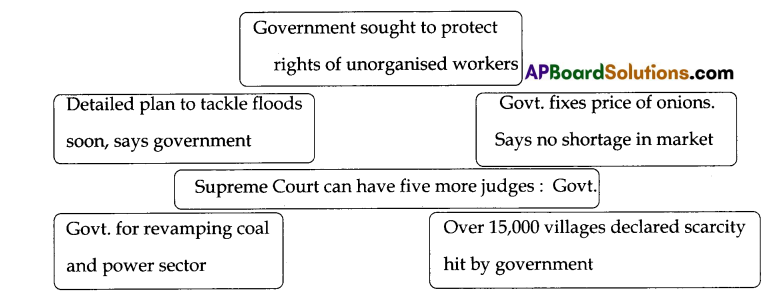
1. Look at the newspaper headlines above and list the different kinds of activities that the government Is reported to be doing in these newspaper headlines.
Answer:
- The government protects the rights of unorganised workers.
- It tackles floods.
- It lises prices of essential commodities.
- It appoints judges to Supreme Court and High Courts.
- It revamps coal and power sector.
2. Can you think of how the government manages to do this?
Answer:
Yes, the government manages to do all this by doing works at different levels that is at the village level, at the state level and at the national level
(Two Marks Questions)
Question 1.
Why do a country need a government?
Answer:
Every country needs a government to make decision and get things done.
Question 2.
What kind of government do we have in India?
Answer:
Democratic form of government we have in India.
Question 3.
What form of democratic government do we have in India?
Answer:
We have representative form of democracy in India.
Question 4.
What did you mean by “democracy”?
Answer:
Abraham Lincoln of America once defined “democracy” as a “government of the people, by the people and for the people”.
Question 5.
What is the basis of our democratic system?
Answer:
Free and fair elections of representatives is the basis of our democratic system.
Question 6.
How are the decisions taken in a democratic country?
Answer:
The decision are taken if they are supported by more than half the members. Simple majority is necessazy for taking decisions.
Question 7.
Who has right to vote in India?
Answer:
All the adults over 18 years, irrespective of caste, sex, religion or race, have right to vote in India.
Question 8.
Define Monarchy.
Answer:
Monarchy is a form 0f government where the authority to take decisions vests in one single person.
Objective Type Questions
Question 1.
Government has …………….. organs ( )
A) 1
B) 2
C) 3
D) 4
Answer:
C) 3
Question 2.
In government, the organ makes the laws ( )
A) Legislative organ
B) Executive organ
C) Judiciary organ
D) all of these
Answer:
A) Legislative organ
Question 3.
What does government do for its people? ( )
A) protects boundaries of countries
B) builds the roads and schools
C) supplies the electricity
D) all of these
Answer:
A) protects boundaries of countries
Question 4.
The number of Stales and Union Territories in our country ( )
A) 29 States and 7 Union Territories
B) 7 States and 28 Union Territories
C) 21 States and 6 Union Territories
D) 28 States and 28 Union Territories
Answer:
none of above
Question 5.
In democracy the supreme power rests with the ( )
A) Parliament
B) President
C) Prime Minister
D) People
Answer:
D) People
![]()
Question 6.
The capital of India is ………………….. . ( )
A) Mumbai
B) Chennai
C) New Delhi
D) Kolkata
Answer:
C) New Delhi
Question 7.
If sovereignty Is vested in a single person. it is known as ………………… . ( )
A) monarchy
B) aristocracy
C) Democracy
D) none of these
Answer:
A) monarchy
Question 8.
Democracy means ( )
A) sovereignty vested In single person
B) sovereignty vested in few persons
C) sovereignty vested in all the people
D) none of these
Answer:
C) sovereignty vested in all the people
Question 9.
In which government the headman implements decisions? ( )
A) tribal government
B) monarchy
C) aristocracy
D) Democracy
Answer:
B) monarchy
Question 10.
In which government no one could question the Klings will? ( )
A) aristocracy
B) monarchy
C) Democracy
D) all al these
Answer:
B) monarchy
Question 11.
Who defined democracy as “Government of the people, by the people and for the people” ( )
A) Abraham Lincoln
B) Aristotle
C) Plato
D) Ruso
Answer:
A) Abraham Lincoln
Question 12.
Fourth estate means ( )
A) legislature
B) Executive organ
C) Judiciary
D) Media / Press
Answer:
D) Media / Press
Question 13.
R.T.I means ( )
A) Right to ignoring
B) Right to illustrate
C) Right to information
D) Right to independence
Answer:
C) Right to information
Question 14.
Which type of government is chosen by the people? ( )
A) aristocracy
B) monarchy
C) Democracy
D) none of these
Answer:
C) Democracy
![]()
Question 15.
Elections are generally held once in ( )
A) 4 years
B) 5 years
C) 8 years
D) 10 years
Answer:
B) 5 years
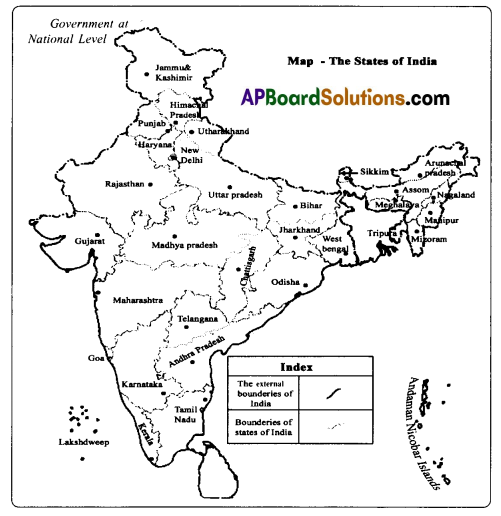
Question 16.
The map shows …………………. .
A) Governments at district level
B) Governments at state level
C) Governments at national level
D) Governments at international level
Answer:
B) Governments at state level
Question 17.
Our state is …………………. .( )
A) Telangana
B) Tamilnadu
C) Karnataka
D) Kerala
Answer:
A) Telangana
Question 18.
This is not true with regard to Telangana ( )
A) A.P is to the south of Telangana
B) Telangana has sea on its border
C) Telangana has Maharashtra on its northern border
D) Telangana and A.P. has Karnataka on their south.
Answer:
B) Telangana has sea on its border
C) Telangana has Maharashtra on its northern border
D) Telangana and A.P. has Karnataka on their south.
Question 19.
Capital of our state is ……………… . ( )
A) Hyderabad
B) Amaravathi
C) Delhi
D) Odisha
Answer:
A) Hyderabad
Question 20.
The north most state of our country ( )
A) Maharashtra
B) Tamilnadu
C) Jammu & Kashmir
D) Gujarat
Answer:
C) Jammu & Kashmir